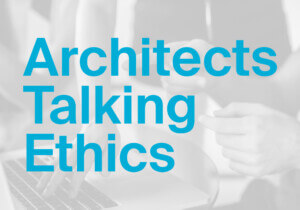This is the start of Architects Talking Ethics, an advice column that intends to host a discussion of the values that architects embody or should embody. It aims to answer real-world ethical questions posed by architects, designers, students, and professors.
We, as the three initial authors of this column, think the profession is way behind in how it addresses ethics. We think architects should explore our own ethics with the breadth and depth that other fields have done for a long time.
In our teaching, we’ve sensed an eagerness among students to talk about ethics. The “ethical turn” in our profession that has a lot to do with equity and environmental responsibility, yet the typical curriculum has, maybe, one lecture on ethics in the pro-practice course. The amount of time and attention we give to ethics in the schools as well as in the profession do not align with its importance. Maybe, with this column, we can encourage more interest.
What are the ethics of architects? What questions about ethics and architecture do you have? What ethical dilemmas do you face or have faced or anticipate facing?
Our first item concerns compensation. It’s a bit of a meta-question, as the three of us are responding without pay. What does it mean for the three of us to agree to do this column on ethics without getting paid? What are the ethical implications of our doing this for free and who do we negatively affect by our agreeing to do so?
Send your questions to ethics@archpaper.com for consideration in future columns.
When, if ever, does it make sense to work for free?
In an ideal world, all work would be paid, either directly or indirectly (think Universal Basic Income). The question raises issues about what constitutes “work” as well as different kinds of “free.”
We all like gardening in our vegetable patches, a type of work: Not all work is the selling of one’s labor time. But we assume the question is indeed about giving over labor to others for free…. Which hits home since we are writing this column for free. (We’ll pick up this up again at the end of this column.)
But what are the different kinds of “free”? There’s free in the sense of a donation, like pro bono work; there’s free in the sense of doing this gratis, like a loss leader (in which you try to attract business by discounting a product or a service); there is the free of volunteering time (whether in the form of noblesse oblige or activism); and there’s “the freed or deferred payment” (where work experience will translate to good payment later).
Bringing both of these together, it is useful to acknowledge different positionalities: younger and more precarious/older and more secure; historically marginalized/privileged from the get-go. It’s not that offering free labor is justified in some contexts and not others. Rather, straying from the all-work-gets-paid ideal is often a legitimate step to greater autonomy. Still, the bottom line is: No one should work for free unless the decision is freely given.
The ethical question here is: Do the ends justify the means (the consequential option) or the means justify the ends (the duty-based option)?
In the context of an architectural office, the lure to work for free as an employee or to cut fees to get a job as an employer is tempting but ethically wrong. To give away work to get work because one’s business model isn’t working is not just self-defeating but ethically wrong for the negative downward effect on whoever else is in that line of work.
This ethical is a question for all work, but in the context of professionalism, ethical ends-and-means are particular and peculiar. Professionals are supposed to occupy a social or economic class that preserves our independent judgment, enabling us to turn down a commission that we think is wrong or to persuade client or community to do what we think is right. At the same time, professionals can’t be all about creating massive wealth, which can become its own incentive and impede our independent judgment. Architecture has not always found that sweet spot between our being either economically independent or economically driven.
As professionals, we need to have enough economic independence in order to decide when and where we are willing to forgo it. Professions that have a self-regulating charter to practice, like medicine and law, maintain independence and the self-regulation because they are considered vital for our society—saving lives of protecting people’s freedoms. The socioeconomic class that a professional is supposed to occupy is one that preserves our independent judgment.
This is an ideal for all “learned” professions that is rarely achieved, but it’s particularly problematic for architecture, which has its unique set of dilemmas. One stems from the history of our profession. Some part of our field historically arose out of the guilds, with a close relationship to the construction industry, and another out of the amateur architect tradition of people who didn’t need to get paid and who designed buildings for enjoyment. A further bit of confusion comes from not knowing whether we are providing a service (like law and medicine) or a product (and if the latter, aesthetic or performative?). Still another dilemma is the difficulty we have understanding ourselves as an industry.
When we are taught in architecture school that the goal post-graduation is to start your own firm, it precludes a worker-forward mentality. This is one reason why we would never in architecture school see something analogous to Yale Law School’s women students, who researched and posted the top-10 family friendly law firms.
And finally, the precarious nature of architectural relevance to society makes firm owners susceptible to thinking “if I can only keep my office lights on, pay my employees and put food on the table by agreeing to build an office park in a protected wetland, I’ll do it.”
These dilemmas need not inhibit our claim to rightful pay. We are, regardless of the lack of clarity about the type of work we do, knowledge workers—we design buildings, not build them—and as such, are capable of withholding labor. Unionized architecture employees will join other knowledge/care workers in journalism, screenwriting, acting, and nursing who are fighting for fair wages and control over our lives. As architectural firm owners, we need to charge fees that allow us to maintain independent judgment and capable of saying, “I don’t need that commission,” “I am going to try to persuade my potential client to build some place better,” or “I’m going to lobby against that project and make sure it doesn’t get built.” As an industry, we need to be organized and self-regulating so we can stop letting developers exploit our existential identity crises to marginalize our pay and our input.
We return to the writing of this column for free. Here are our (ethical?) reasons for doing so. First, the three of us are privileged not just economically but, as white professionals, have little to lose in expounding controversial positions. Second, we’re writing this for free because this conversation is not happening at a more institutional level, whether that institution is the AIA or the architecture schools. This commitment to ethical pay and work is something that should have been in place a long time ago. And third, we are writing this for free because the two primary ethical codes in our field, those of the AIA and NCARB, are only used in a punitive way, scolding those for taking bribes of stealing a client. Unlike medicine and law, which each have codes of ethics that charge their professionals to work for community health and underserved citizens, architecture has none. There is a strange resistance to a larger aspirational conversation about the ethical mission of architecture. With this column we hope to change this condition.
Send your questions to ethics@archpaper.com for consideration in future columns.
Victoria Beach was a faculty fellow at Harvard’s Center for Ethics and wrote the textbook for the first ethics class at the GSD. She has had her own architectural practice for nearly 30 years and has recently held elected office in California.
Peggy Deamer is professor emerita, Yale School of Architecture and a founding member of the Architecture Lobby. She has practiced architecture for 45 years and is the author Architecture and Labor.
Tom Fisher is a professor in the College of Design at the University of Minnesota and the director of the Minnesota Design Center. A former dean of the college, he was also an editor at Progressive Architecture magazine for 14 years.
The views of our writers do not necessarily reflect those of the staff or advisers of The Architect’s Newspaper.











